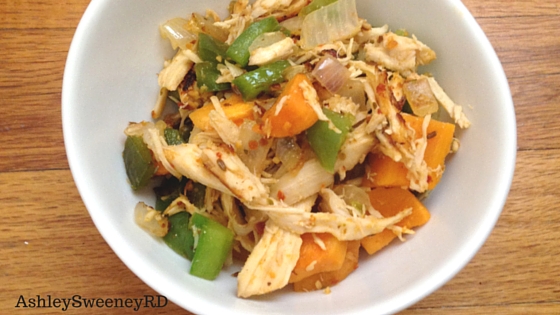You may, or may not know, that I was a vegetarian for the last 12 years! Yes, 12 years. I’ve recently started eating chicken & turkey again. Many of you who have asked me why… and I wanted to be able to give you a full explanation instead of the quick Facebook response.
There are many reasons for why I was vegetarian for that long in the first place, let me give you a little background…
I became a vegetarian for many reasons, but I stayed a vegetarian because that is how I felt healthiest. When working with my one-on-one clients, I have had no problem including meat into their meal plans. I have never been anti-meat, or animal rights activist (not that that isn’t important), or thought that people who ate meat were wrong for doing so. I just felt my best with what I was doing! My family grew up eating meat & potatoes, and it wasn’t until I turned vegetarian in high school that my awesome mom helped me get healthy by cooking new recipes, new vegetables and trying new things! My siblings and I all love to cook and be in the kitchen- I think it’s because my mom was always so awesome in the kitchen! But, we didn’t grow up eating a lot of different vegetables.
(Read my full About Me here!)
My mom & brother are allergic to seafood, and my dad never liked it, so we didn’t grow up eating fish or seafood like a lot of families. My husband loves seafood though, so after we got married I started trying some fish & seafood, because I know it has a lot of health benefits! So, technically, that last few years I was a “pescatarian,” because I did occasionally eat fish. I was never a full vegan, because I still included eggs, yogurt, cheese, and honey in my diet. I just avoided meat, red meat, chicken, and poultry.

In 2011, I found out I was slightly anemic. Instead of taking heavy supplements, I started really focusing on food pairings to increase my iron naturally. It was around then also that I started drinking Shakeology regularly, and combined, I was able to increase my blood irons and have never been anemic since, even throughout my pregnancy, a time when many women do become slightly anemic. Shakeology has 30% of the recommended intake for iron, so I know that also is helped increase my iron stores.
I was never concerned about getting enough protein. One of the biggest worries people have about going vegetarian is that they won’t have enough protein. Between shakeology, yogurt, cheese, eggs, beans, legumes, grains and veggies, I ate plenty of protein! That was never an issue for me… until I had my baby.
Shortly after my baby was born last August, I started noticing different digestive issues that I have never had before and I couldn’t tell if what I was eating was making a difference with my baby and her GI issues either. I think all women who breastfeed get worried about this at some point or another. Well, I was finding that when I ate yogurt or ice cream, I was having really upset stomach and gas. From talking to other moms (this is not scientifically proven), many also think they became slightly lactose intolerant after their pregnancy, and I think this happened to me too. Cheese has little- no lactose, so I was having no problems with cheese.
Also, a new problem I was having was that whenever I ate beans, especially canned beans and chickpeas, I was having horrendous stomach pain. It was as if I’d never eaten beans in my life. Dried black beans that I cook myself are a regular staple in my house, and those didn’t hurt as bad, but, it was still an odd pain to have, so I pretty much avoided beans all together. I realized quickly that it’s not uncommon for people to have problems digesting beans.
Beans, legumes & pulses are known to cause GI issues for some people. “Pulses” are a family of legumes including the lentils & peas. Did you know they were called pulses? These beans, legumes & pulses contain a complex carbohydrate called oligosaccharides.
When consumed, these oligosaccharides reach the lower intestine largely intact, and in the presence of anaerobic bacteria ferment and produce carbon dioxide and methane gases, as well as a good deal of discomfort, not to mention embarrassment in polite society. The solution has been to prepare the beans in a way to neutralize or otherwise get rid of these sugars in the resulting cooked beans, but as most of us know from experience, results can vary widely. – See more here.
Harder beans such as kidney beans and chickpeas have more oligisaccharides then the softer pulses such as lentils. I was even avoiding hummus! (insert gasp here)! I had an easier time eating lentils and would enjoy my favorite recipes like my lentil tacos pretty often. For the record, you can help ease GI discomfort in beans by using dried beans, soaking them first, and rinsing and cooking canned beans.
So here I was, the vegetarian who ate fish like once a month, basically only eating Shakeology & eggs for her protein. It wasn’t enough. I need more variety and more options in my life.
I went back and forth for like 2 months discussing this with my husband. I was seriously so torn. He didn’t think it was that big of a deal, and most people don’t, but to me, being vegetarian was part of who I felt I was. Food & nutrition is so important to me, I thought I was changing too much or doing something I shouldn’t be.
In reality, i was a vegetarian because that is how I felt healthiest. And I was no longer the healthiest I could be. So, I started adding chicken into my regular diet. Then a few months later, we added some turkey into the mix!
I was able to breastfeed my daughter for a year, maintain a healthy iron level, get back to my pre-baby weight, and feel great because of choices I made to listen to my body & put my health first!


